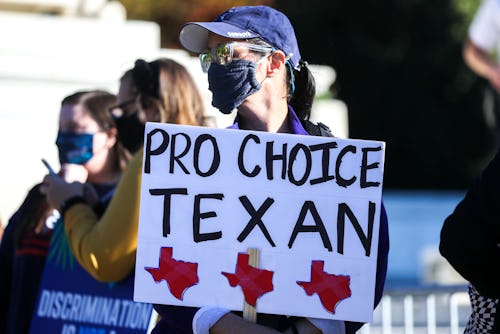The Supreme Court just let Texas keep its abominable abortion ban
Health care providers can sue the state, per the ruling, but the law will stay in place for now.

The United States Supreme Court on Friday released its long-awaited decision on Texas’s near-total ban on abortions, ruling that the although the draconian assault on reproductive health care in that state would stand, abortion providers would still be able to to sue over the law.
The ruling comes just months after the high court let Texas’s S.B.8 law stand, effectively halting all abortion procedures in the state, while the case worked its way through the appeals process. And while Friday’s decision does afford providers an avenue to continue challenging the rule, the court’s conservative majority limited who can be sued, essentially narrowing any legal recourse while simultaneously allowing the ban against any abortions conducted after six weeks into a person’s pregnancy to remain in effect.
In large part, Friday’s ruling was less an indictment of the abortion ban itself than a critique of the law’s structure. As Chief Justice John Roberts wrote: “The nature of the federal right infringed does not matter; it is the role of the Supreme Court in our constitutional system that is at stake.” Put simply, the court’s decisions were largely based on the nebulous interplay between the Supreme Court’s authority and that of the states attempting to subvert that structure for their own purposes.
Only liberal Justice Sonya Sotomayor seemed prepared to call out Friday’s ruling, and the abortion ban itself, for the substance of the law in question. Couching her opinion in the language of federal judicial authority, Sotomayor compared the ruling to the opinions of infamous slavery-defender John C. Calhoun, noting that:
The nation fought a Civil War over that proposition, but Calhoun’s theories were not extinguished. They experienced a revival in the post-war South, and the violence that ensued led Congress to enact Rev. Stat. §1979, 42 U. S. C. §1983. “Proponents of the legislation noted that state courts were being used to harass and injure individuals, either because the state courts were powerless to stop deprivations or were in league with those who were bent upon abrogation of federally protected rights.”
The implication from Sotomayor, no matter its framing as a question of federal versus state rights, is clear: Texas’s abortion ban is a wrong on par with the country’s upholding of slavery. “The court should have put an end to this madness months ago, before S.B.8 first went into effect,” Sotomayor wrote, lambasting the decision. “It failed to do so then, and it fails again today.”
“By foreclosing suit against state-court officials and the state attorney general, the court effectively invites other states to refine S.B.8’s model for nullifying federal rights,” she continued. “The court thus betrays not only the citizens of Texas, but also our constitutional system of government.”
For now, abortions in Texas remain virtually illegal. And with the Supreme Court seemingly poised to overturn the overarching precedent set by Roe v. Wade, it appears unlikely that things will change anytime soon.